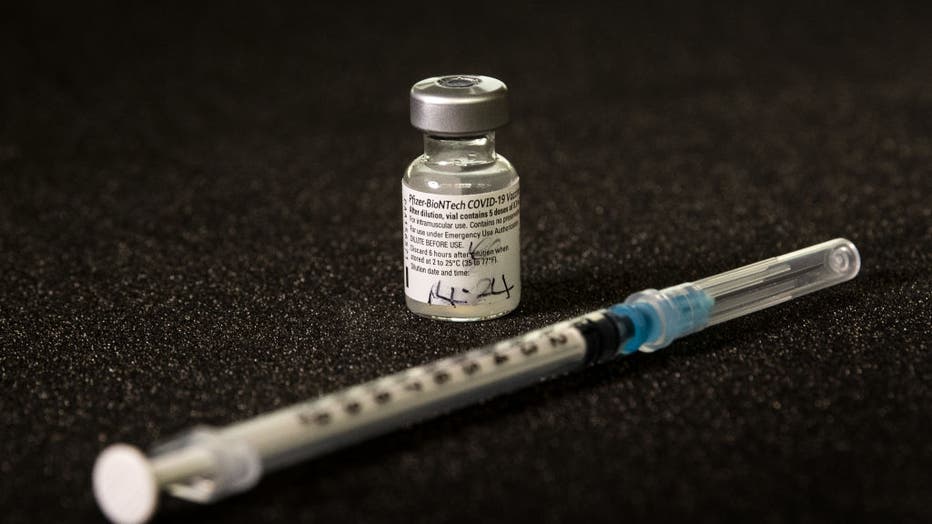Pfizer begins COVID-19 vaccine trial for children under 12
Pfizer-BioNTech has joined Moderna in testing its COVID-19 vaccine in children younger than 12, including babies as young as 6 months, with the possibility of expanding availability of the shot to the age group in early 2022.
Healthy child volunteers in the early-stage global trial were given their first injections on Wednesday. Twin 9-year-old girls were among the first of the group in the U.S., who received the shots at Duke University.
Pfizer’s vaccine was granted an emergency use authorization by the U.S. Food and Drug Administration in late December for those aged 16 and older. Nearly 66 million shots of its two-dose vaccine had been administered in the U.S. as of Wednesday, data from the U.S. Centers for Disease Control and Prevention shows.
Pfizer said it will enroll 144 children in the first phase of the trial. It will separate participants into three age groups (5-11 years, 2-5 years, and 6 months to 2 years) and start with the oldest age group first. The participants will begin by receiving a 10 microgram dose of the vaccine and the trial will progressively build to higher doses, the company said.
RELATED: Vaccinating children against COVID-19 will be crucial to ending pandemic, experts say
Phase 2/3 part of the trial will evaluate the safety, tolerability and the type of immune response generated over time of for the selected dose level in each age group. Some children will also placebo shots, the company said.
After a six-month follow-up visit, those who originally received the placebo will be unblinded and offered the opportunity to receive the vaccine.
Results from the trial are expected in the second half of 2021, and Pfizer hopes to vaccinate younger children early next year, Sharon Castillo, a spokeswoman for the pharmaceutical company, told the New York Times.

FILE - A vial of the Pfizer-BioNTech COVID-19 vaccine and syringe is shown in a file image dated March 11, 2021. (Photo by Victoria Jones/PA Images via Getty Images)
Moderna, another vaccine currently being administered in the U.S. for those age 18 and up, also began a study of its shot in younger children this month.
Both Moderna and Pfizer-BioNTech have completed enrollment for studies of children ages 12 and older and are expected to release the data in the months ahead. Johnson & Johnson, the most recent vaccine to receive an emergency use authorization from the FDA, is beginning to enroll participants in its trial for children 12 and up.
RELATED: Moderna begins study of COVID-19 vaccine in children under 12
Researchers started studying the vaccine with older children because they tend to respond to vaccines most similarly to adults. The study in younger children will be more complex because scientists need to determine whether to use smaller doses than in adults and adolescents.
Children develop serious illness or die from COVID-19 at much lower rates than adults, but they do still get sick and can still spread the virus. Thousands of kids have been hospitalized with the virus over the course of the pandemic. Some have gotten MIS-C, a rare inflammatory syndrome in children linked to COVID-19. More than 260 children have died in the U.S. from the virus.
Children also make up about one-fourth of the U.S. population. As the country continues its mass vaccination effort against the coronavirus, experts say getting kids inoculated will be crucial to ending the pandemic and ultimately returning to some kind of normalcy.
The spread of more contagious variants of the virus, which has killed 545,000 Americans, has also increased the need for more people to get their shots as soon as possible.
"If children are 25% of the population, you would either have to vaccinate every single last adult or we have to also vaccinate the children," said Dr. Kawsar Talaat, an infectious disease physician and assistant professor with the Johns Hopkins Bloomberg School of Public Health.
Considering some adults will not be immunized for various reasons, vaccinating the country’s younger population is a needed step to achieving widespread immunity to the virus.
Drexel University pediatrics professor Dr. Sarah Long told the Associated Press that immunizing children will be vital to society returning to a time before masks and social distancing.
"It’s unlikely we could get community protection without immunizing children," Long said. "This is the lynchpin to getting everything back to some kind of normalcy."
RELATED: Scientist behind Pfizer-BioNTech COVID-19 vaccine says next target is cancer
This story was reported from Cincinnati.



